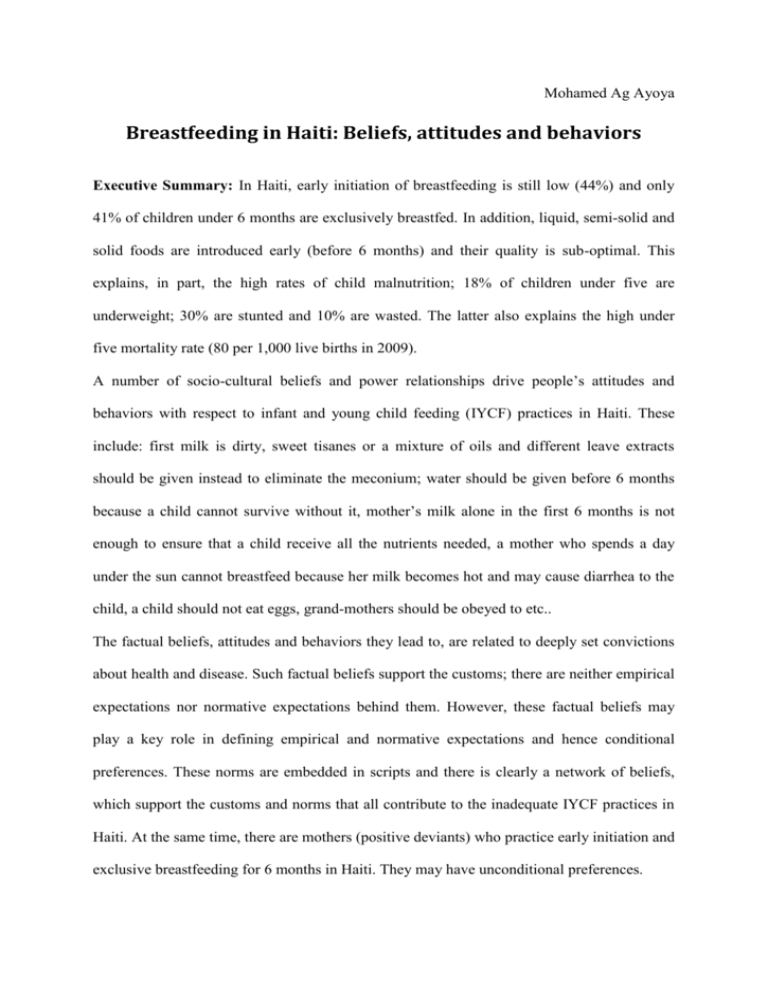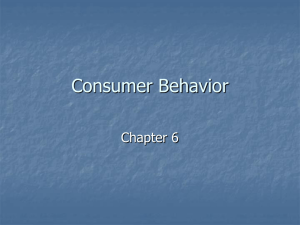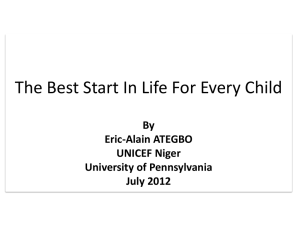Breastfeeding in Haiti: Beliefs, attitudes and behaviors
advertisement

Mohamed Ag Ayoya Breastfeeding in Haiti: Beliefs, attitudes and behaviors Executive Summary: In Haiti, early initiation of breastfeeding is still low (44%) and only 41% of children under 6 months are exclusively breastfed. In addition, liquid, semi-solid and solid foods are introduced early (before 6 months) and their quality is sub-optimal. This explains, in part, the high rates of child malnutrition; 18% of children under five are underweight; 30% are stunted and 10% are wasted. The latter also explains the high under five mortality rate (80 per 1,000 live births in 2009). A number of socio-cultural beliefs and power relationships drive people’s attitudes and behaviors with respect to infant and young child feeding (IYCF) practices in Haiti. These include: first milk is dirty, sweet tisanes or a mixture of oils and different leave extracts should be given instead to eliminate the meconium; water should be given before 6 months because a child cannot survive without it, mother’s milk alone in the first 6 months is not enough to ensure that a child receive all the nutrients needed, a mother who spends a day under the sun cannot breastfeed because her milk becomes hot and may cause diarrhea to the child, a child should not eat eggs, grand-mothers should be obeyed to etc.. The factual beliefs, attitudes and behaviors they lead to, are related to deeply set convictions about health and disease. Such factual beliefs support the customs; there are neither empirical expectations nor normative expectations behind them. However, these factual beliefs may play a key role in defining empirical and normative expectations and hence conditional preferences. These norms are embedded in scripts and there is clearly a network of beliefs, which support the customs and norms that all contribute to the inadequate IYCF practices in Haiti. At the same time, there are mothers (positive deviants) who practice early initiation and exclusive breastfeeding for 6 months in Haiti. They may have unconditional preferences. Interventions implemented to address inappropriate IYCF practices have had so far an inconsistent impact for many reasons. Ineffective communication strategy has been among the top ones. Therefore, one of the new and major proposed approaches is to do a community-based research that will help understand better the factual beliefs, attitudes and practices that govern the practice and what lies behind them. This will be a diagnostic study allowing for a detailed analysis of the community dynamics and the networks; the discovery of the most important people for the mothers and their attitudes as well as the respect and gossip networks in the community. Based on the findings of this research, a broader discussion and an open dialogue will be held with communities to trigger argumentation and engagement. Then this will be used to develop a comprehensive long term communication strategy that is participatory, pedagogical and culturally suitable. The strategy will address the rationale of existing wrong factual beliefs, include all reference group members and messages will be delivered by trustworthy sources and trained facilitators. Alternatives to wrong factual beliefs will be offered. Every component (activity) of the strategy will be highly visible and publicized. The First Lady, who is known for her strong commitment to the social sector and for children and women’s wellbeing in Haiti, will serve as the breastfeeding ambassador and advocate. A major focus will be on ensuring a close link between the information being diffused and people’s everyday lives. This means being creative, suggesting solutions to the reasons (beliefs) given by communities using very basic facts to address the issue. Special attention will be given to poorly educated and rural women with little access to health care and in targeting mothers-in-law, grand-mothers and fathers so that they provide support to the lactating mother. Furthermore, existing approaches (baby friendly hospital initiative and mothers’ support groups will be strengthened. Collective incentives such as awards, certificates or conditional cash transfers will be given to best performing women’s groups and communities publicly to recognize their contributions.






